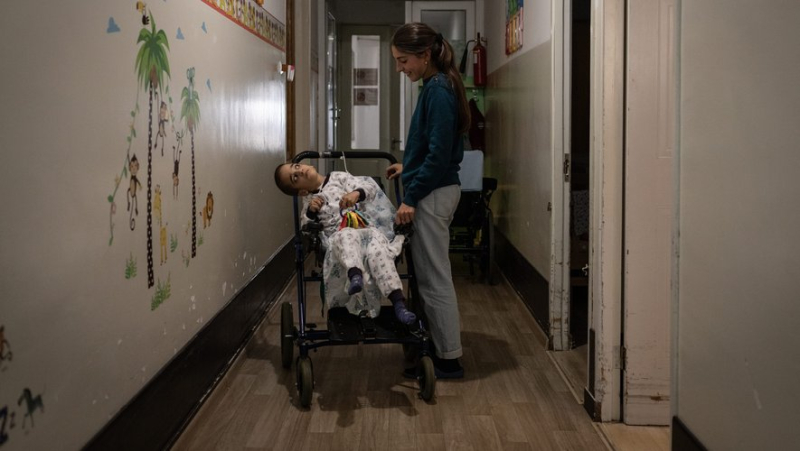Disabled people in France: the shocking documentary “Forbidden Zone”, this Sunday evening on M6

La prise en charge des personnes handicapées en France fait l'objet d'une émission critique ce soit sur M6, dans “Zone interdite”. MAXPPP – Chris Huby/Le Pictorium
The Sunday show offers a survey which shows that the treatment of disability in our country presents numerous failings. Without concession, the report speaks of a "state scandal". No more no less.
The subject is sensitive. It concerns the management of disability in our country. In its weekly show “Forbidden Zone”, this Sunday evening at 9:10 p.m., M6 makes it its core subject. The show promises to address the "black issues of disability" and even talks about "state scandal". Suffice to say that the show wants to challenge the general public and public authorities through revelations "shock".
For more than a year, a team of journalists from the show filmed the daily reality of disabled people, as well as their loved ones. She filmed their fight to make this daily life more acceptable. The result is severe. "Lack of reception structures, chronic understaffing and unqualified staff: the system supposed to help people with disabilities thrive and get them out of trouble. isolation, neglects them, even violently…", affirms the channel.
30 000 people "left without solution"
In total, 30,000 children and their families "are left without solution and isolated".Throughout the show, testimonies from parents of disabled children and people assisting a loved one with a disability appear. That of Virginie, whose son Jules, a 7-year-old boy with multiple disabilities, is moving. "Jules doesn't fit into any box. At seven years old, he is already rejected by society, she says, exhausted.
Manque de structures d’accueil, sous-effectif chronique et personnel non qualifié : le système censé épanouir les personnes en situation de handicap et les sortir de l’isolement, les néglige, voire les violente…
📺 #ZoneInterdite, ce dimanche à 21:10 sur M6 pic.twitter.com/ZFvOlRh50s
— Zone Interdite (@ZoneInterdite) March 21, 2024
Suffering from a genetic disease, Jules is waiting for a place in a specialized institute. A place did eventually become available, but it is far from the family home, in Belgium, a thousand kilometers away. There is also Sandrine’s. She is raising her son Arthur, 7 years old, alone. The latter suffers from a severe form of autism, which prevents him from having a normal social life.
Arthur cannot find a place in a specialized institute
We learn throughout the show that Arthur cannot stand traditional school. His teacher does not want to see him for more than two hours a week, so that he does not disrupt his class. A hard blow for Sandrine. She has been trying for years to secure a place for her son in a specialized institute. Without success.
He is offered a solution, which he is not very happy with: a few hours of schooling per week. In other words, a solution that suits no one. A solution which even disrupts the school life of their little friends. Yet, the law of February 11, 2005 for inclusiveness provides that any child, any adolescent with a disability or a disabling disorder of the health, has the right to enroll in the school in his neighborhood.
A journalist films daily life from the inside
She is faced with institutions that pass the buck, she deplores. Also exhausted, she threatens the Regional Health Agency: she will not hesitate to chain herself in front of the ARS headquarters. National education, which is supposed to educate all children, is taking it for granted. Its efforts to welcome children with their carers for children with disabilities (AESH) are insufficient.
To tell the situation from the inside, a journalist from the show even goes so far as to be hired as an AESH. Despite her lack of experience, she was recruited within a few days, for a salary of 800 euros for 24 hours of work per week. Not really motivating. She films the daily lives of disabled students from the inside. They are left aside by the staff. Due to a lack of adapted lessons, children with disabilities have no other choice than to watch a… cartoon.
National education singled out
National Education is not the only one to be singled out. The socio-educational sector is also. This is a sector where 50,000 positions are still vacant. Like the school, it suffers from a lack of attractiveness and precarious remuneration. It is difficult in these conditions to have sufficiently qualified personnel for this type of mission.
Especially since the working conditions are also precarious. The reception structures have not benefited from the necessary investments and have not been modernized. Consequence: we are witnessing numerous abuses, brought to light by the reporting. We discover situations of physical abuse, psychological pressure, and even medication errors. The show tells the case of Gaëtan, 27 years old, autistic.
Part of dedicated aid diverted ?
The journalists reveal that Gaëtan spent several weeks in care, between life and death. In question, "a probable drug overdose". In addition, when he was hospitalized, he also had "a significant fracture in his shoulder".< /em> His parents took legal action. For them, there is no doubt, their son was the victim of mistreatment in the home that accommodated him.
Finally, final avatar: part of the aid intended for disabled people would be stolen from them. A scandal that is both social and financial. The documentary is chilling.




